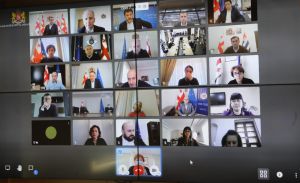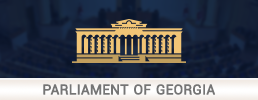2020-11-07


In light of the country's epidemiological situation and rapidly growing infection numbers, the Interagency Coordination Council has decided to impose additional localized restrictions.
During today's videoconference led by Prime Minister Giorgi Gakharia, the council agreed to start enforcing additional localized restrictions on November 9.
In particular, on the Interagency Coordination Council's decision:
• Starting November 9, both pedestrian and transport traffic will be prohibited after 10 PM in large cities: Tbilisi, Kutaisi, Batumi, Rustavi, Zugdidi, Gori, and Poti.
- This restriction does not apply to:
- International freight transport
- In coordination with the Operations Command, to persons and transport whose movement is essential for fulfilling their duties, including representatives medical, pharmaceutical, and strategically important sites and media outlets, and delivery service couriers.
• All organizations must close at 10 PM, except medical, pharmaceutical, and strategically important sites.
• Both municipal and private kindergartens will be temporarily closed in Tbilisi, Kutaisi, Batumi, Rustavi, Zugdidi, Gori, and Poti.
• Special measures will be taken in the cities above to reduce passenger numbers on municipal transport. Transport traffic will not be restricted at daytime.
As the meeting pointed out, enforcing additional localized restrictions is due to the epidemiological situation and compliance with enforced rules and epidemiologists' recommendations, including facemask use and social distancing-during political processes, among others.
The council discussed measures designed to help prevent the hospital sector from overloading. To that end, only severe cases must be hospitalized. Treatment of milder cases at home, with active consultations from family physicians, is the best way to prevent the healthcare system from overloading and yet to ensure that persons urgently requiring medical services are not left behind, the council pointed out. Patients who cannot self-isolate will be settled in COVID hotels where, in line with the Prime Minister's instructions, therapy components have been stepped up and continuous medical supervision is provided.
In addition, retrained sophomore medical students and volunteer doctors engage in the management of coronavirus infection cases. With the Health Ministry's coordination, a pool of volunteers is being put together to include both retrained students and retired doctors, who are subsequently assigned across the clinical sector, also being actively engaged in the management of infection cases, through the online clinics operating under the aegis of the Health Ministry. Additionally, doctors specializing in a variety of areas and having necessary skills are mobilized to participate in patient management.
The council also discussed the worsening pandemic-related global state of affairs. Over the past 24 hours, the number new confirmed cases exceeded 620,000, making the global count of cases close to 50 million.
In light of Georgia's epidemiological situation, the Interagency Coordination Council discussed a package of localized restrictions designed to increase the effectiveness of flattening the curve.
So far, Georgia has had a total of 54,852 confirmed COVID-19 cases, with 39,773 recoveries and 441 fatalities.
Presently, 3,015 persons are quarantined, 2,599 are at COVID hotels, and 4,670 are hospitalized under medical supervision.
The Parliament of Georgia led by Speaker Archil Talakvadze, and the President's Administration, are actively involved in the work of the Interagency Coordination Council under the Prime Minister.
Press Service of the Government Administration











